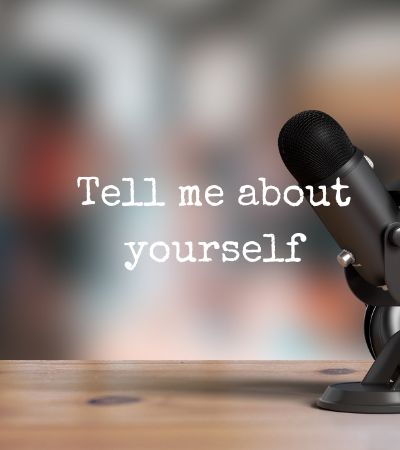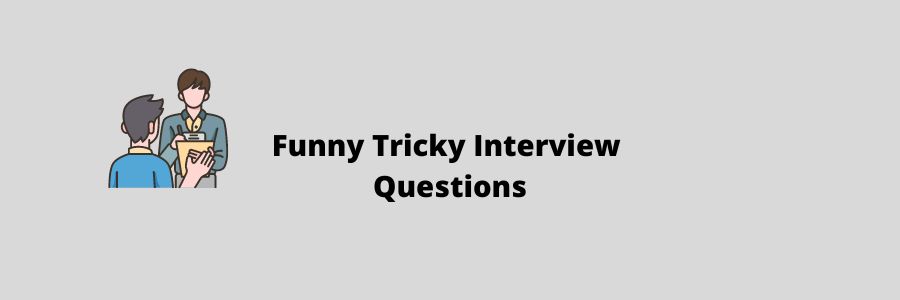Contents
- Funny Tricky Interview Questions
- Brilliant Answers to Tough Interview Questions
- 5. We all have weaknesses. What are some of your major weaknesses?
- 6. What type of decisions do you have trouble making?
- 7. What is your biggest failure?
- 8. Since we are considering two other candidates for this position. Why should we hire you rather than someone else?
- 9. How do you spend your free time?
- 10. Express your ideal career.
- 11. Tell me something about yourself that I didn’t know from reading your resume.
- 12. Tell me what you know about this company.
- 13. Why should we hire you?
Funny Tricky Interview Questions: Job interviews are tough, but you can be prepared! Learn how to answer some of the toughest interview questions, with examples of the best answers.
Funny Tricky Interview Questions
1. Tell me about yourself.

Provide an answer that includes information about
• where you grew up,
• where you went to school,
• your initial work experience,
• additional education and special training,
• where you are now, and
• what do you intend to do next?
Practical answer
“I was born in Uvalde, Texas, and attended Uvalde High School. Ever since I was a teenager, I played with computers. It was my hobby, my passion, and my way of learning. Like most kids I enjoyed computer games, I mastered, Window and WordPerfect within six months When was in class six. By the time I graduated high school, I knew I wanted to study programming. From that point on, everything fell into place. My life revolved around computing. By my junior year at The University of Texas at Austin, I decided I wanted to work for a major software manufacturer. That is why I had an internship last summer at Cliff Software.
I am aiming at becoming a major player in the industry so I can be at the forefront of breaking trends and new technology. My college roommate told me about his start in your sector, I requested him for a referral from your company, which brought me here today.
I am prepared to answer any questions you may have about my education and experience.”
What to avoid
Giving unnecessary information that is not related to the position applied for
2. Where do you see yourself five years from now?
• Provide an answer that will show that you are focused on achieving a specific professional goal
• Be consistent with objectives on the resume
• Answer should be employer centered
Practical answer
“In five years I hope to be working as an IT guru in an increasingly responsible position that enables me to utilize my talents and work closely with my colleagues in solving important problems. I see myself taking on new and electrifying challenges in an enjoyable environment and hopefully, this will be with your company.”
What to avoid
Do not indicate that you hope to start your own business, change careers, or go back to school.
Read: Get to Know You Questions for Students
3. Describe a major goal you’ve set for yourself lately.
Give an example of a professional goal you both set and achieved. eg
• improved time management skills,
• achieved new performance targets,
• Learned a new skill.
Practical answer
I organized a community support program that raised $300, 000 in matching funds to purchase new computers for the local schools involved in our organization’s social responsibility.
What to avoid
Avoid answers that lack interesting outcomes and your abilities
4. Describe what would you change about our company?
Seek a middle ground by focusing on one or two non-threatening issues that may have come up in your discussions.
What to avoid
Giving radical answers that will cause rapid change to the organization’s operations.
Brilliant Answers to Tough Interview Questions
5. We all have weaknesses. What are some of your major weaknesses?
The best way to handle this question is to mention personal weaknesses that are outside the job or a professional weakness that you have already improved upon
Practical answer,
I tend giving attention to other people’s needs that sometimes they always refer me to issues that can be easily resolved or “I have an inclination to take on too much on my own but lately I have been able to delegate more.”
What to avoid
This is not the time to confess all your problems or to confidently say you have no weaknesses.
6. What type of decisions do you have trouble making?
Show that you are generally decisive but mention that there are situations that give you time to pause or you are learning how to better make decisions.
Practical answer
“I sometimes have difficulty choosing between two equally good ideas.” or “I used to have difficulty saying ‘no’ to people until I learned to better set priorities.”
What to avoid
Avoid giving indecisive answer that may portray a negative answer
7. What is your biggest failure?
Focus on something outside your work or something that happened on the job that you later fixed. Choose something that will not reflect badly on your ability to perform in the given position, such as one that took place early in your career.
Practical answer,
“My biggest failure was not being selected in the US Army since I was diagnosed with night vision problems. When I was 20, all I wanted to be was a Soldier. But I’m glad I didn’t, because I may have overlooked an exciting career in Auditing”
What to avoid
Do not admit to any personal quality that might hamper job performance, such as procrastination, laziness or lack of concentration.
8. Since we are considering two other candidates for this position. Why should we hire you rather than someone else?
Let the employer know you want the job and you will enjoy working with them. Focus on what strengths you bring to the table. These should be consistent with the four things most employers are looking for in candidates during the job interview:
• competence
• professionalism
• enthusiasm
• Likability
What to avoid
Do not be distracted by the mention of two other candidates, you don’t know anything about them and they could be fictitious
9. How do you spend your free time?
Focus on some of the standard hobbies or activities that most people engage in: boating, reading, music, opera, collecting, gardening, or cooking.
What to avoid
Avoid revealing your entrepreneurial spirit-it may indicate you are planning to leave and go solo as soon as the business starts doing well.
10. Express your ideal career.
Talk about what you enjoy, skills that are natural to you, realistic problems or opportunities you’d expect in this particular job or industry, and what you hope to learn from those experiences
Practical answer
“I’d like to stay in a field related to teaching no matter what happens. In college was interested in Marketing, but I have come to learn that teaching is somehow in my blood.
What to avoid
Avoid mentioning specific time frames or job title
11. Tell me something about yourself that I didn’t know from reading your resume.
Think of a talent or skill that didn’t quite fit into your employment history, but that’s unique and reveals something intriguing about your personality or past experience.
What to avoid
Don’t just repeat what’s on your resume.
12. Tell me what you know about this company.
Describe your first encounter or a recent encounter with the company or its products and services. What would be particularly motivating to you about working there as opposed to working the same type of job in a different company? The recruiter will look for evidence of genuine interest and more than just surface research on the company. Reciting the annual report isn’t likely to impress most recruiters, but feedback from customers and employees will.
Practical answer
“I served as an intern to one of your distributers; I followed all the supply chains closely.. I’m particularly interested in your new department that specializes in coffee branding and marketing
What to avoid
Reciting the annual report or having vague information isn’t likely to impress most recruiters
13. Why should we hire you?
One should show complete confidence in his or her ability.
Practical answer
“My experience and qualifications make me do my job only better, and in my opinion. My business experience helps me run the Accounts department in a cost-efficient manner, thus saving the company money. My qualifications are better for your company, too, since you’ll be getting a better return for your investment. Again, I’m interested in establishing a long-term relationship with my employer, and if I did well, I would expect expanded responsibilities that could make use of even other skills.”
What to avoid
The candidate shouldn’t hesitate in answering this question.

Betty is a qualified teacher with a Bachelor of Education (Arts). In addition, she is a registered Certified Public Accountant. She has been teaching and offering part-time accounting services for the last 10 years. She is passionate about education, accounting, writing, and traveling.
